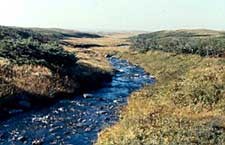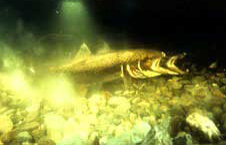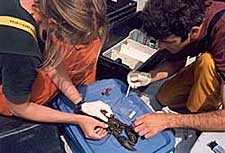Examples of Students' Research Topics
Honours BSc Students
- Fung, Jonathan (2001) Environmental sex determination in a cichlid fish.
- Gerber, Leah (2000) Sex-biassed movement, dispersal, and seasonal growth rate in brook trout, Salvelinus fontinalis.
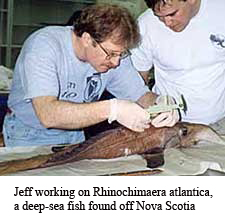
- Smith, Cheryl-Anne (2000) Lipid composition of reproductive subtidal and intertidal male white sticklebacks, Gasterosteus sp.
- Fitzgerald, Gretchen (1999) Life history variation in three- and four-spine stickleback populations.
- Pickle, Alison (1997) Overwinter changes in lipid composition of brook trout, Salvelinus fontinalis, in relation to size, sex, and reproductive state.
- Joyce, Warren (1997) Migration of the porbeagle shark, Lamna nasus, in eastern Canada.
- Jewett, Tara (1996) Effect of time of day on research survey estimates of Atlantic cod, Gadus morhua, biomass.
Graduate Students
- Jones, Matthew W., PhD, 2001. Application of genetic markers to conservation biology: salmonid fish in Eastern Canada.
- Jewett, Tara, MSc, 2001. Temporal and spatial variation in reproductive investment in Atlantic cod, Gadus morhua.
- Adams, Blair K., MSc, 1999. Variation in genetic structure and life histories among populations of brook char, Salvelinus fontinalis, from insular Newfoundland, Canada.
- George, Sarah N., MSc, 1998. Selectivity of coral reef fishes in a Caribbean trap fishery.
- Adams, Blair K., PhD, ongoing.. Reproductive success and evolutionary persistence of alternative migratory forms in Atlantic salmon.
- den Heyer, Nell, PhD, ongoing. The ecological basis of habitat selection and movement in American lobster.
- Eddy, Jennifer, MSc, ongoing. Outbreeding depression in Atlantic salmon.
- Hardie, David, PhD., ongoing. Evolutionary ecology of Arctic fishes.
- MacDonald, Janice F., PhD, ongoing. Alternative reproductive strategies in male white sticklebacks.
- Marcil, Julie, MSc, ongoing. Disentangling the genetic and environmental basis to morphological variation among populations of Atlantic cod.
- McCairns, Scott , MSc, ongoing. The influence of environmental variation on brook trout life histories.
- Rowe, Sherrylynn, PhD, ongoing. Correlates of mate competition, mate choice, and reproductive success in Atlantic cod.
- Weir, Laura, MSc, ongoing. The influence of domestication on individual reproductive success in male Atlantic salmon parr.
|
|
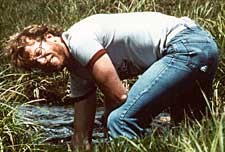 |
Telemetry tags are used to study lobster migration
|
Jeff in the field on Cape Race, Newfoundland
|
Some Graduates' Occupations
- Head of Fisheries Research, St. Lucia
- Postdoctoral Fellow, Canadian Department of Fisheries and Oceans
- Research Scientist, Canadian Department of Fisheries and Oceans
- Biologist, Canadian Department of Fisheries and Oceans
- Research Assistant, Department of Biology, ║┌┴¤│ď╣¤═°
|
Selected Publications
Hutchings, J.A. 2003. Norms of reaction and phenotypic plasticity in salmonid life histories. In: A.P. Hendry and S.C. Stearns [eds], Evolution Illuminated: Salmon and Their Relatives, Oxford University Press, Oxford. In press.
Koops, M.A., Hutchings, J.A., and B.K. Adams. 2003. Environmental predictability and the cost of imperfect information: influences on offspring size variability. Evol. Ecol. Res. 5: 29-42.
McIntyre, T.M., and J.A. Hutchings. 2003. Small-scale temporal and spatial variation in Atlantic cod, Gadus morhua, life histories. Can. J. Fish. Aquat. Sci. In press.
Wilson, A.J., Hutchings, J.A., and M.M. Ferguson. 2003. Selective and genetic constraints on the evolution of body size in a stream-dwelling fish. J. Evol. Biol. In press.
Hutchings, J.A. 2003. Life histories of fish. In: P.J.B. Hart and J.D. Reynolds [eds], Handbook of Fish Biology and Fisheries Vol. 1. Fish Biology, Blackwell Science, Oxford, pp. 149-174.
Hutchings, J.A. 2002. Sustaining Atlantic salmon in the Northwest Atlantic: considerations from a life history perspective. In: K.D. Lynch, M.L. Jones, and W.W. Taylor [eds], Sustaining North American Salmon: Perspectives Across Regions and Disciplines, American Fisheries Society, Bethesda, MD, pp. 33-60.
Hutchings, J.A., and L. Gerber. 2002. Sex-biased dispersal in a salmonid fish. Proc. R. Soc. Lond. B. 269: 2487-2493.
Jones, M.W., and J.A. Hutchings. 2002. Individual variation in Atlantic salmon fertilization success: implications for effective population size. Ecological Applications 12: 184-193.
Hutchings, J.A. 2001. Conservation biology of marine fishes: perceptions and caveats regarding assignment of extinction risk. Can. J. Fish. Aquat. SCI58: 108-121.
Jones, M.W., and J.A. Hutchings. 2001. The influence of male parr body size and mate competition on fertilization success and effective population size in Atlantic salmon. Heredity 86: 675-684.
Hutchings, J.A. 2000. Collapse and recovery of marine fishes. Nature (Lond.) 406: 882-885.
Refereed Publications
Koops, M.A., Hutchings, J.A., and T.M. McIntyre. Submitted. Detecting an effect of maternal condition on fecundity and recruitment in fishes. Can. J. Fish. Aquat. SCI
Rowe, S., and J.A. Hutchings. Submitted. Mating systems and the conservation of marine fishes. Trends in Ecology and Evolution.
Adams, B.K., And J.A. Hutchings. 2003. Microgeographic population structure of brook charr: a comparison of microsatellite and mark-recapture data. J. Fish Biol. 62: 517-533.
Swain, D.P., Hutchings, J.A., and C.J. Foote. 2003. Environmental versus genetic influences on identification characters. In: S.X. Cadrin, K.D. Friedland, and J. Waldman [eds], Stock Identification Methods, Academic Press, New York. In press.
Wilson, A.J., Hutchings, J.A., and M.M. Ferguson. 2003. Dispersal in a stream dwelling salmonid: inferences from tagging and microsatellite studies. Conservation Genetics. In press.
Hutchings, J.A., Neis, B., and P. Ripley. 2002. The nature of cod: perceptions of stock structure and cod behaviour by fishermen, 'experts' and scientists from the nineteenth century to present. In: R. Ommer [ed], The Resilient Outport: Ecology, Economy and Society in Rural Newfoundland, ISER Books, St. John's, NF, pp. 140-185.
Barrett, S.C.H., Beare-Rogers, J.L., Brunk, C.G., Caulfield, T.A., Ellis, B.E., Fortin, M.G., Pong, A.J.H., Hutchings, J.A., Kennelly, J.J., McNeil, J.N., Ritter, L., Wittenberg, K.M., Wyndham, R.C., And R.Y. Yada. 2001. Special issue by an expert panel of The Royal Society of Canada - Elements of precaution: recommendations for the regulation of food biotechnology in Canada. Journal of Toxicology and Environmental Health-Part A 64: 1-212.
Cadigan, S.T., And J.A. Hutchings. 2001. Nineteenth-century expansion of the Newfoundland fishery for Atlantic cod: an exporation of underlying causes. Res. Mar. Hist. 21: 31-65.
Hutchings, J.A. 2001. Influence of population decline, fishing, and spawner variability on the recovery of marine fishes. Journal of Fish Biology 59 (Suppl. A): 306-322.
Jones, M.W., McParland, T.L., Hutchings, J.A., and R.G. Danzmann. 2001. Low genetic variability in lake populations of brook trout (Salvelinus fontinalis): a consequence of exploitation? Conservation Genetics 2: 245-256.
Hutchings, J.A. 2000. Numerical assessment in the front seat, ecology and evolution in the back seat: time to change drivers in fisheries and aquatic sciences? Marine Ecology Progress Series 208: 299-303.
Hutchings, J.A., and M. Ferguson. 2000. Temporal changes in harvesting dynamics of Canadian inshore fisheries for northern Atlantic cod, Gadus morhua. Can. J. Fish. Aquat. Sci. 57: 805-814.
Hutchings, J.A., and M. Ferguson. 2000. Links between fishers' knowledge, fisheries science, and management: Newfoundland's inshore fishery for northern Atlantic cod, Gadus Morhua. In: B. Neis and L. Felt [eds], Finding Our Sea Legs: Linking Fishery People and their Knowledge with Science and Management, ISER Books, St. John's, NF, pp. 82-110.
Links
|

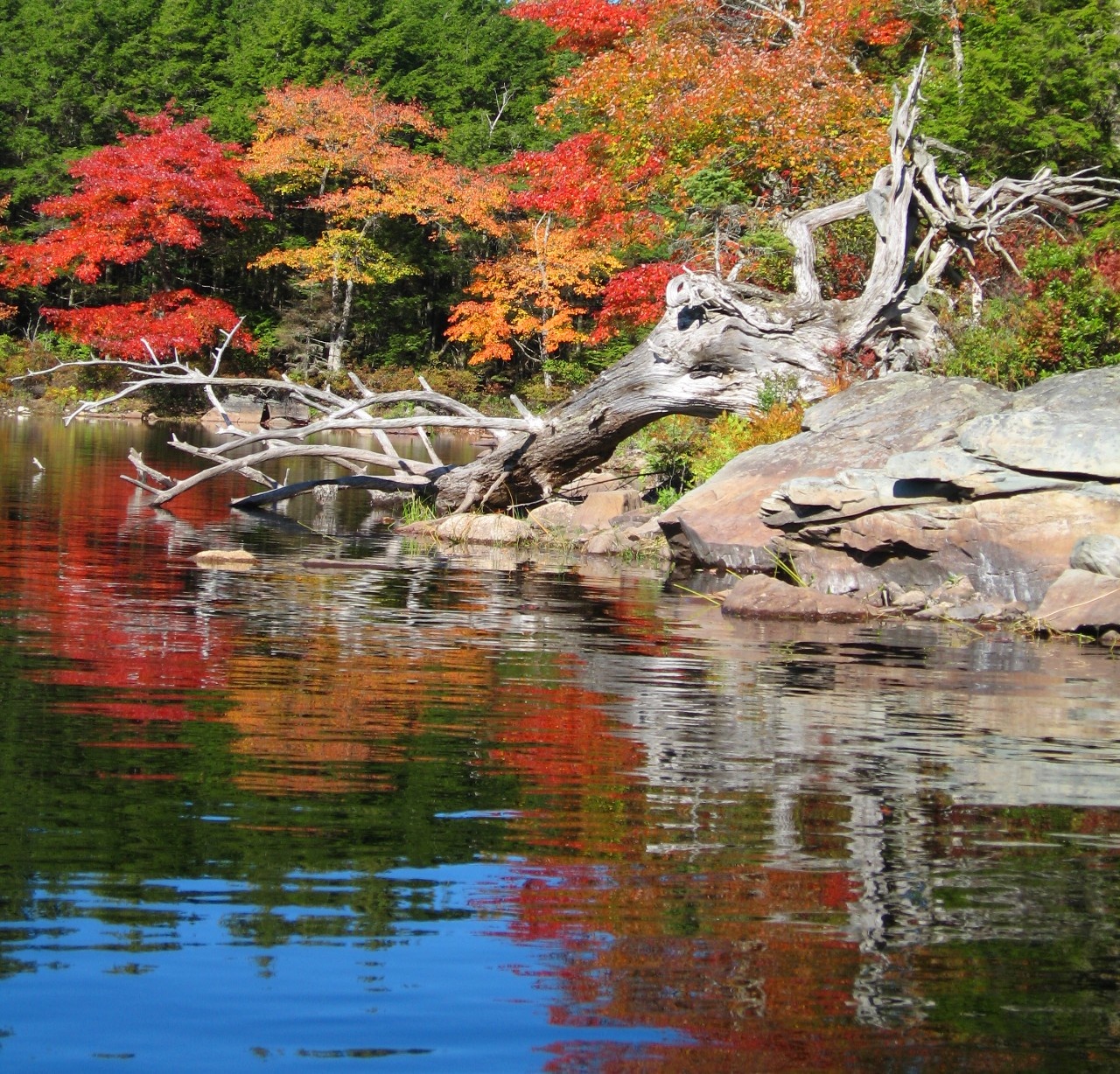
 esearch focuses upon questions in the fields of evolutionary ecology, conservation biology, and population biology. Central to the research projects I undertake in each of these areas is an attempt to understand the tremendous variability that exists in reproductive strategies within and among natural populations of fishes.
esearch focuses upon questions in the fields of evolutionary ecology, conservation biology, and population biology. Central to the research projects I undertake in each of these areas is an attempt to understand the tremendous variability that exists in reproductive strategies within and among natural populations of fishes.